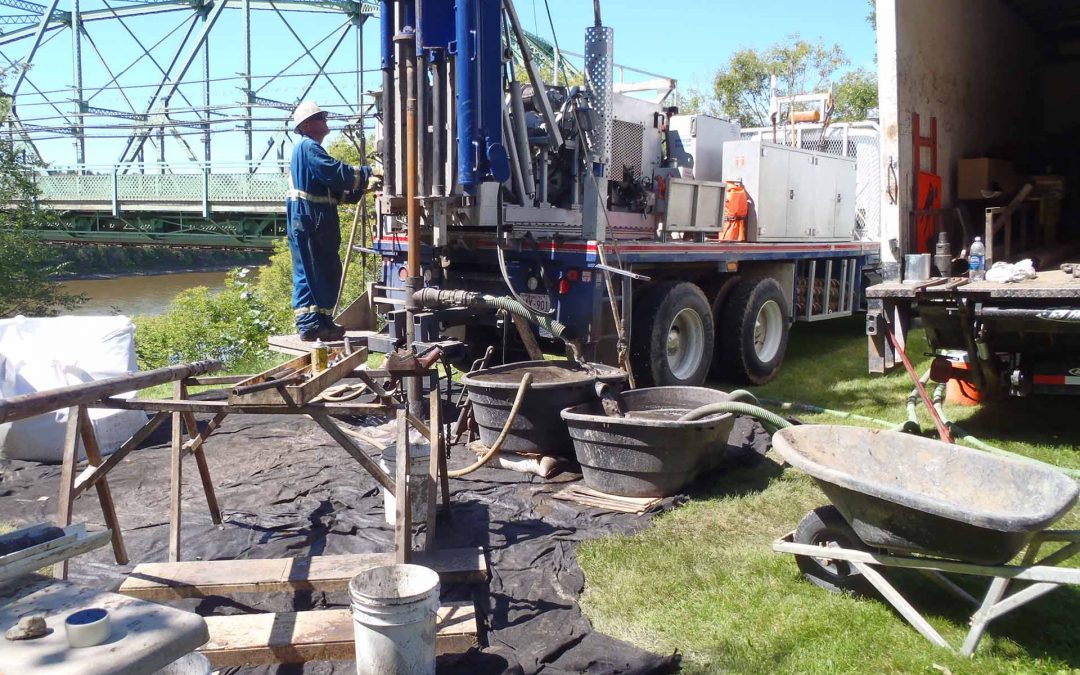There will be a presentation from each of two U of A students: Ms. Umme Rima (2018 Morgenstern Award receipent) and Mr. Tony Zheng (2018 CGS Conference presentation).
GSE/CGS CCLT: Dr. Ian Moore, P.Eng., FCAE, FEIC, FCSCE, Professor and Canada Research Chair in Infrastructure Engineering, GeoEngineering Centre at Queen’s, RMC, Kingston, Ontario, Canada – Geomechanics of Trenchless Pipe Installation, Repair, and Replacement
Traditional pipe installation and replacement involves extensive excavation of trenches along the full length of the pipeline that are both expensive and disruptive. To minimize those costs, many different ‘trenchless technologies’ have been developed by contractors and manufacturers, to permit pipe installation, pipe repair and pipe replacement using minimal earthworks. The inventive individuals and organizations that develop these techniques generally focus on development of the construction tools, materials and procedures, rather than the geotechnical (and structural) consequences of these methods, and so a variety of Geomechanics investigations are needed to establish how ground conditions influence the success or failure of such projects.
The presenter has worked for the last twenty years exploring the Geomechanics and soil-pipe interactions associated with trenchless technologies, and this lecture presents an overview of some of the associated research problems and their solutions. After introducing three of the commonest trenchless technologies, examples are presented illustrating how computational and experimental projects are being used to explain and quantify the underlying Geomechanics phenomena. First, pipe installation using horizontal directional drilling is introduced, and the Geomechanics research illustrated considering studies of mud transportation from the borehole as a result of blowout or hydrofracture. Next, pipe repair using liners is introduced, with description of research investigations of soil-pipe-liner interaction under earth loads. Finally, pipe replacement using static pipe bursting is explained, where studies have explained how cavity expansion and soil dilation lead to uplift at the ground surface and damage to overlying infrastructure.
Trained in Australia, Dr. Moore has been Canada Research Chair in Infrastructure Engineering at Queen’s University since 2001. An expert on the behavior and design of buried pipes, Dr. Moore’s more than 300 publications contribute to scholarship as well as North American and other codes, design and construction practices for culverts, sewers, manholes, liners, storm-water detention chambers and pressure pipe systems. Other activities include editorship of the Canadian Geotechnical Journal and the 4th edition of the Canadian Foundation Engineering Manual, and keynote lectures in North America, Asia, Europe, Africa and Australia.
Dr. Moore’s work has been recognized by various honors, including the Meyerhof, Stermac, Geosynthetics and Quigley Awards of the Canadian Geotechnical Society, the John B. Stirling Medal of the Engineering Institute of Canada, the John R. Booker and Outstanding Contributions Medals of the International Association for Computer Methods and Analysis in Geomechanics, and best paper awards from the American Society of Civil Engineers, the Canadian Society for Civil Engineering, the Institution of Civil Engineers, and the North American Society for Trenchless Technology. Dr. Moore is a Fellow of the Canadian Academy of Engineering and other learned societies. From 2002 to 2019 he served as Executive Director of the GeoEngineering Centre at Queen’s – RMC, and since 2018 has been Head of Civil Engineering at Queen’s University.

